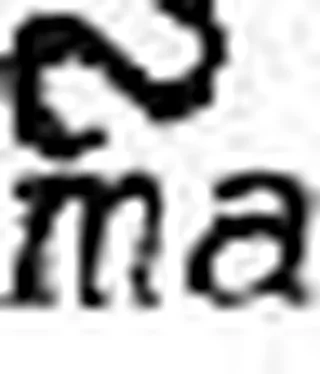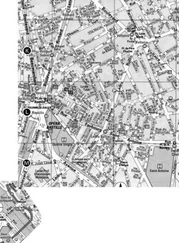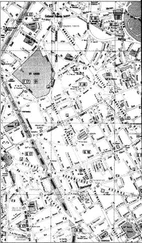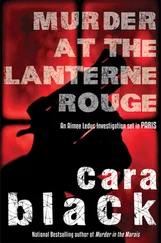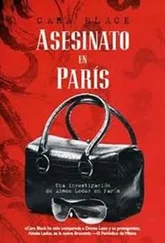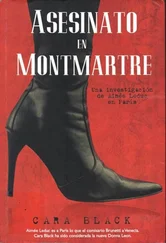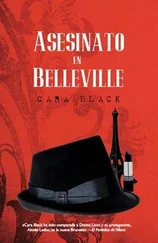“Monsieur, I’m looking for Hervé Gassot or the number of the group’s secretary.”
“Let me see,” he said. He ran his tobacco-stained finger over a directory. “ Voilà ! Hervé Gassot himself’s the secretary now; he saw combat at Dien Bien Phu.”
Her hopes rose. “There were rumors that a cache of jade was looted from the Emperor’s tomb near Dien Bien Phu. . . .”
“Gassot spent time in Indochina. He knows all the stories, that’s for sure. But he keeps to himself. There’s only one number listed for him.” He scratched his grizzled head of hair. “ Non , here’s another one, not sure which is which. Maybe a contact number. Not all of the members have telephones.”
He wrote them both down on paper and passed it to her.
“Merci.”
“ We’ve got a symposium tonight,” he said, heading toward a stack of folding chairs. “I need to set up, if you’ll excuse me.”
She tried one number on her cell phone. After ten rings she gave up. She tried the second. Again, the phone rang and rang. Disappointed, she hung up.
She walked toward the Batignolles church and then, under the brown awning of the boulangerie , she saw him: the hawk-nosed flic from the RG visit. The one from the team involved in the Place Vendôme surveillance where her father had been killed. She had never known his name or rank. The whole project had been hush hush. Ministry of the Interior, Ministry of Defense, they all peed in the same place, as her father used to say.
Had he been following her or was he nosing around for the jade on his own?
The man buttoned up his rain jacket and strode past the crime scene tape. She tailed him down rue Legendre for several blocks to a small two-story café- tabac : one of those she’d already visited this morning. She followed him inside, smiled at the owner, and bought some cassis-flavored gum at the cigarette counter as he mounted the back stairs.
A minute later she, too, went upstairs to find a smoke-filled rectangular room, the restroom beyond. Cracked leather banquette seats lined the wall, mirrors above them. The room was deserted, except for several tables and chairs. At one, three men played belote, a card game similar to bridge, a game she’d never had the patience to learn.
She sat down at the hawk-nosed man’s table, nodding to the heavy-lidded owner/waiter taking his order for an espresso.
“You know my name,” she said. “What’s yours?”
“Did I ask you to sit here?”
She heard more annoyance than surprise in his voice.
“I invited myself,” she smiled. “Sometimes I do that. But we already know each other.”
“How’s that?”
“Last night your group searched my apartment without a warrant, remember?”
He looked away. “You’ve mistaken me for someone else.”
She bit back a remark about short-term memory loss, and got to the heart of the matter. “Think back to five years ago, Inspecteur. . . ?”
“Pleyet,” he acknowledged, shifting away from her.
In the mirror she saw the belote players look up, then go back to their game, slapping cards on the table. From below came the sound of the télé with its replayed horse races.
“I’m in the traffic division, Mademoiselle.”
And if she believed that, she’d believe anything. He didn’t look like a meter maid. Or act like one.
“Then where’s your ticket book?” she asked. “You were with the RG last night.”
He shrugged. “They called me.”
“You were involved in the Place Vendôme surveillance five years ago.”
“Never.” His eyes narrowed. “Why do you keep bringing that up? Such persistance is rude.”
“Remember one of your old colleagues, Jean-Claude Leduc, my father?”
“Guess he forgot to send you to charm school,” he said.
She felt the wooden floor vibrating as his foot began tapping.
“Is the man who works with the RG your evil twin?”
No smile answered her back. “Traffic’s my job,” he insisted. “Since 1992.”
The heavy-lidded owner returned with two steaming espressos and two glasses of water, and set them on the water-ringed table together with a glass carafe. Aimée handed him a ten franc piece. Light from the wall sconce caught and danced on the carafe’s thick rim. Around them rose occasional exclamations, then the shuffle of the belote players’ cards.
“Looks like you’re on duty,” she said.
“The traffic bureau closed early,” he said, yawning. “Just a quick cup of coffee, then the train home.”
She doubted that. “How is the jade tied to the RG, Inspecteur Pleyet?”
Anger flickered in his eyes and he gripped her elbow in a steely hold.
For a moment the card game stopped. The only sounds were the rumble of the milk steamer machine below. She looked up. One of the men said “Fold” and the others threw their cards on the table.
Pleyet relaxed his grip. In one movement, he pulled on his windbreaker jacket and stood.
“You didn’t answer my question, Inspecteur. Were you on assignment in postwar Indochina?” she asked, taking a gamble. “You look the type.”
“Why do you say that?”
She might as well probe deeper. “After Dien Bien Phu a lot of archeological treasures went missing, didn’t they? There were several incidents of looting. Did the Sixth Battalion have anything to do with that?”
“I don’t know what you’re talking about.”
He threw some francs on the table and left.
She gulped her espresso and watched him from the window as he walked down rue des Batignolles. Pleyet was lying. She smelled it. She could understand him not revealing his cover in a café. But would he tell her more somewhere else?
She figured Pleyet was the type to have been airlifted into a pre-dawn Lagos when things got sticky, or infiltrated into an aborted revolution that needed suctioning out. The “gleaners” were what some called them. “Mopping up” was the other term she’d heard. Guess it depended on how big a mess they found.
One of the card players, a man with a silver-white tonsure of hair, brushed past and bumped her table, spilling her glass of water.
“Pardonnez-moi , Mademoiselle,” he said, his wide grin exposing several gold-capped teeth. “So clumsy. May I buy you a drink?”
She didn’t fancy a tête-à-tête with this old mec or his cronies, but he’d been civil.
“Pas grave, don’t worry, monsieur,” she said and made her way downstairs.
She checked her Tintin watch. The doors of the auction houses would be open now.
Wednesday Morning
Hervé Gassot gazed nervously at his two comrades. Yvon Nemours, stocky, wearing a too small tracksuit that strained around his thick waist, searched the crowd. Picq, standing by the blue-veined rabbit carcasses in the covered Marché de Batignolles, lit a cigarette.
Was this safe enough? Did the crowd of shoppers and market hawkers that surrounded them make them inconspicuous? All around them, women wheeled shopping carts and jockeyed for position at the cheese sellers. Pungent, acrid odors emanated from the stand where a man in a white apron, stained with yellow runny streaks, discussed the merits of a ripe St. Nectaire with a customer.
“Albert had become chummy with Thadée, the gallery owner shot yesterday,” Picq said, cupping his cigarette between his forefinger and thumb like a Pigalle mobster.
“We know that, Picq.”
“More than chummy. You know Albert’s big mouth. Seems he talked about the old days and this mec’s related to the family.”
“Related?”
“They own the buildings, that’s why he had his gallery there.
Читать дальше
